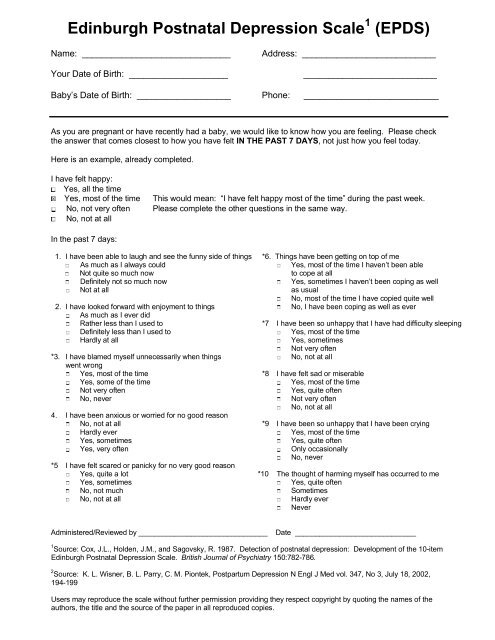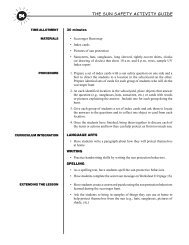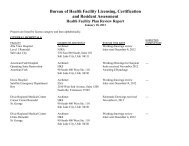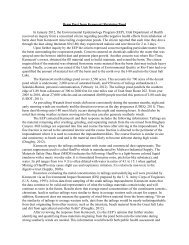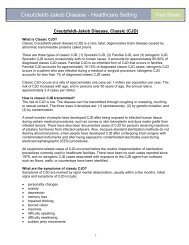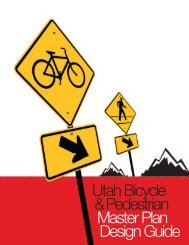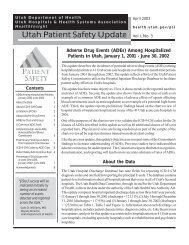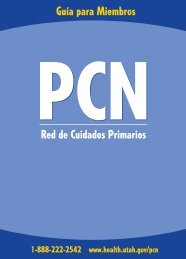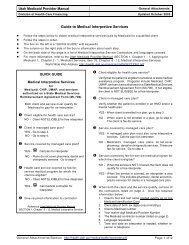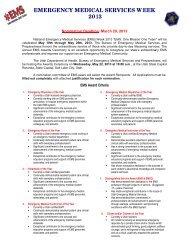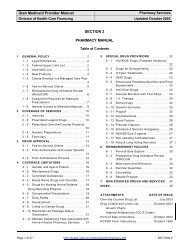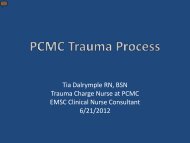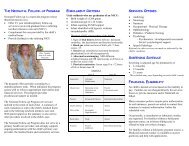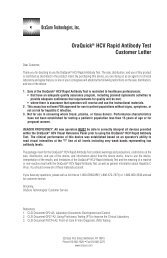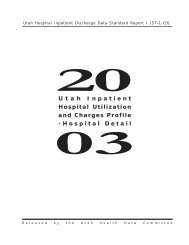Edinburgh Postnatal Depression Scale - Utah Department of Health
Edinburgh Postnatal Depression Scale - Utah Department of Health
Edinburgh Postnatal Depression Scale - Utah Department of Health
You also want an ePaper? Increase the reach of your titles
YUMPU automatically turns print PDFs into web optimized ePapers that Google loves.
<strong>Edinburgh</strong> <strong>Postnatal</strong> <strong>Depression</strong> <strong>Scale</strong> 1 (EPDS)<br />
Name: ______________________________ Address: ___________________________<br />
Your Date <strong>of</strong> Birth: ____________________ ___________________________<br />
Baby’s Date <strong>of</strong> Birth: ___________________ Phone: _________________________<br />
As you are pregnant or have recently had a baby, we would like to know how you are feeling. Please check<br />
the answer that comes closest to how you have felt IN THE PAST 7 DAYS, not just how you feel today.<br />
Here is an example, already completed.<br />
I have felt happy:<br />
Yes, all the time<br />
Yes, most <strong>of</strong> the time This would mean: “I have felt happy most <strong>of</strong> the time” during the past week.<br />
No, not very <strong>of</strong>ten Please complete the other questions in the same way.<br />
No, not at all<br />
In the past 7 days:<br />
1. I have been able to laugh and see the funny side <strong>of</strong> things *6. Things have been getting on top <strong>of</strong> me<br />
As much as I always could Yes, most <strong>of</strong> the time I haven’t been able<br />
Not quite so much now to cope at all<br />
Definitely not so much now Yes, sometimes I haven’t been coping as well<br />
Not at all as usual<br />
No, most <strong>of</strong> the time I have copied quite well<br />
2. I have looked forward with enjoyment to things No, I have been coping as well as ever<br />
As much as I ever did<br />
Rather less than I used to *7 I have been so unhappy that I have had difficulty sleeping<br />
Definitely less than I used to Yes, most <strong>of</strong> the time<br />
Hardly at all Yes, sometimes<br />
Not very <strong>of</strong>ten<br />
*3. I have blamed myself unnecessarily when things No, not at all<br />
went wrong<br />
Yes, most <strong>of</strong> the time *8 I have felt sad or miserable<br />
Yes, some <strong>of</strong> the time Yes, most <strong>of</strong> the time<br />
Not very <strong>of</strong>ten Yes, quite <strong>of</strong>ten<br />
No, never Not very <strong>of</strong>ten<br />
No, not at all<br />
4. I have been anxious or worried for no good reason<br />
No, not at all *9 I have been so unhappy that I have been crying<br />
Hardly ever Yes, most <strong>of</strong> the time<br />
Yes, sometimes Yes, quite <strong>of</strong>ten<br />
Yes, very <strong>of</strong>ten Only occasionally<br />
No, never<br />
*5 I have felt scared or panicky for no very good reason<br />
Yes, quite a lot *10 The thought <strong>of</strong> harming myself has occurred to me<br />
Yes, sometimes Yes, quite <strong>of</strong>ten<br />
No, not much Sometimes<br />
No, not at all Hardly ever<br />
Never<br />
Administered/Reviewed by ________________________________ Date ______________________________<br />
1 Source: Cox, J.L., Holden, J.M., and Sagovsky, R. 1987. Detection <strong>of</strong> postnatal depression: Development <strong>of</strong> the 10-item<br />
<strong>Edinburgh</strong> <strong>Postnatal</strong> <strong>Depression</strong> <strong>Scale</strong>. British Journal <strong>of</strong> Psychiatry 150:782-786.<br />
2 Source: K. L. Wisner, B. L. Parry, C. M. Piontek, Postpartum <strong>Depression</strong> N Engl J Med vol. 347, No 3, July 18, 2002,<br />
194-199<br />
Users may reproduce the scale without further permission providing they respect copyright by quoting the names <strong>of</strong> the<br />
authors, the title and the source <strong>of</strong> the paper in all reproduced copies.
<strong>Edinburgh</strong> <strong>Postnatal</strong> <strong>Depression</strong> <strong>Scale</strong> 1 (EPDS)<br />
Postpartum depression is the most common complication <strong>of</strong> childbearing. 2 The 10-question <strong>Edinburgh</strong><br />
<strong>Postnatal</strong> <strong>Depression</strong> <strong>Scale</strong> (EPDS) is a valuable and efficient way <strong>of</strong> identifying patients at risk for “perinatal”<br />
depression. The EPDS is easy to administer and has proven to be an effective screening tool.<br />
Mothers who score above 13 are likely to be suffering from a depressive illness <strong>of</strong> varying severity. The EPDS<br />
score should not override clinical judgment. A careful clinical assessment should be carried out to confirm the<br />
diagnosis. The scale indicates how the mother has felt during the previous week. In doubtful cases it may<br />
be useful to repeat the tool after 2 weeks. The scale will not detect mothers with anxiety neuroses, phobias or<br />
personality disorders.<br />
Women with postpartum depression need not feel alone. They may find useful information on the web sites <strong>of</strong><br />
the National Women’s <strong>Health</strong> Information Center and from groups such as Postpartum<br />
Support International and <strong>Depression</strong> after Delivery<br />
.<br />
SCORING<br />
QUESTIONS 1, 2, & 4 (without an *)<br />
Are scored 0, 1, 2 or 3 with top box scored as 0 and the bottom box scored as 3.<br />
QUESTIONS 3, 510 (marked with an *)<br />
Are reverse scored, with the top box scored as a 3 and the bottom box scored as 0.<br />
Maximum score: 30<br />
Possible <strong>Depression</strong>: 10 or greater<br />
Always look at item 10 (suicidal thoughts)<br />
Users may reproduce the scale without further permission, providing they respect copyright by quoting the<br />
names <strong>of</strong> the authors, the title, and the source <strong>of</strong> the paper in all reproduced copies.<br />
Instructions for using the <strong>Edinburgh</strong> <strong>Postnatal</strong> <strong>Depression</strong> <strong>Scale</strong>:<br />
1. The mother is asked to check the response that comes closest to how she has been feeling<br />
in the previous 7 days.<br />
2. All the items must be completed.<br />
3. Care should be taken to avoid the possibility <strong>of</strong> the mother discussing her answers with<br />
others. (Answers come from the mother or pregnant woman.)<br />
4. The mother should complete the scale herself, unless she has limited English or has difficulty<br />
with reading.<br />
1 Source: Cox, J.L., Holden, J.M., and Sagovsky, R. 1987. Detection <strong>of</strong> postnatal depression: Development <strong>of</strong> the 10-item<br />
<strong>Edinburgh</strong> <strong>Postnatal</strong> <strong>Depression</strong> <strong>Scale</strong>. British Journal <strong>of</strong> Psychiatry 150:782-786.<br />
2 Source: K. L. Wisner, B. L. Parry, C. M. Piontek, Postpartum <strong>Depression</strong> N Engl J Med vol. 347, No 3, July 18, 2002,<br />
194-199


